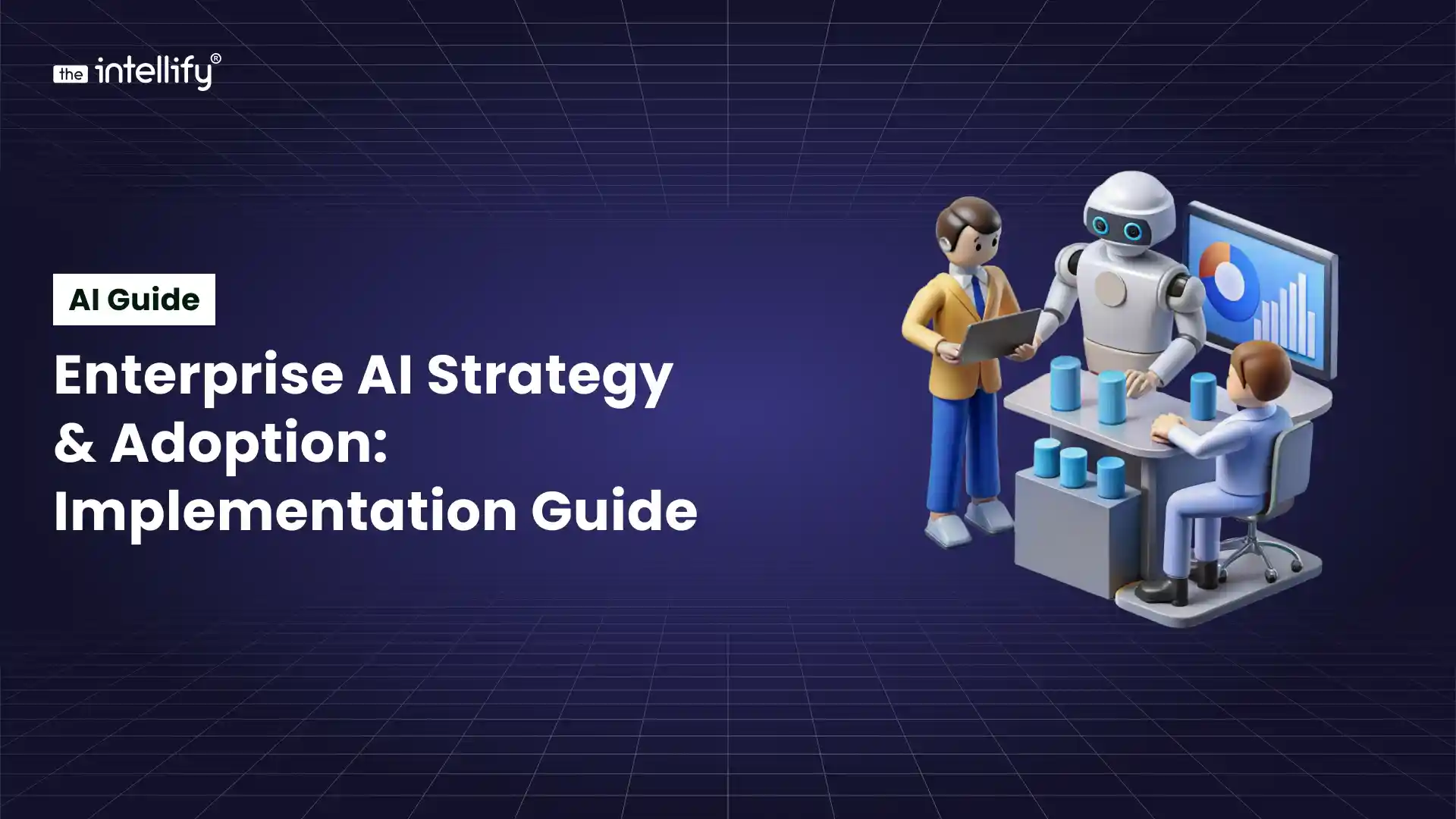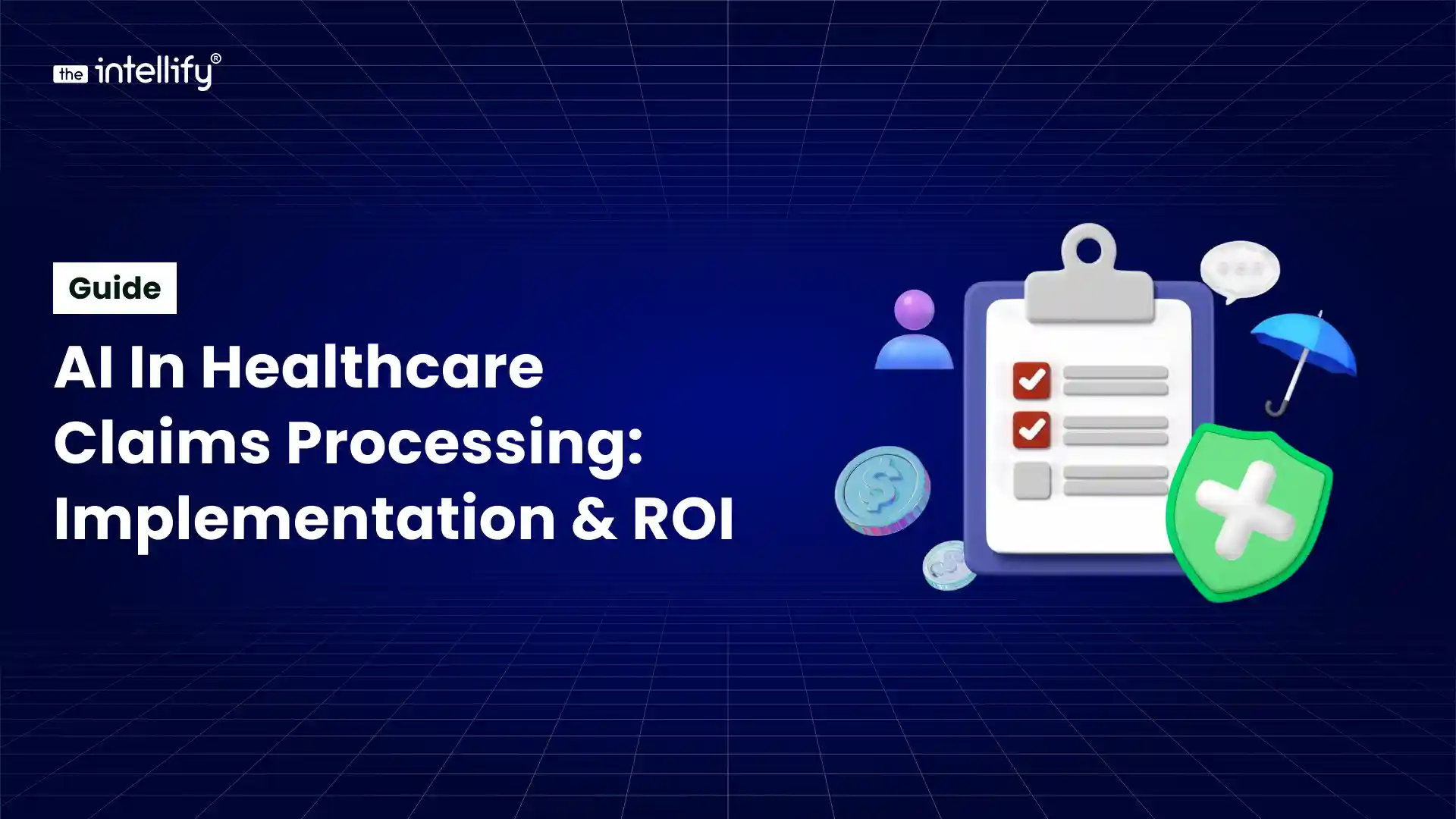AI in Healthcare & Medical Field Industry: Examples, Use Cases, and Benefits

By Darshak Doshi
August 11, 2025

Summary
AI in Healthcare is transforming the medical field by making diagnostics more accurate, accelerating the development of new medicines, and personalising treatments for patients. This technology helps save money and improve patient outcomes by making hospital operations more efficient and providing 24/7 support through tools like chatbots. To be used safely, it’s essential to manage risks such as patient data privacy and potential biases in AI systems.
The AI Revolution in Medicine: An Introduction and Market Overview

The healthcare industry is in the midst of a technological revolution, with Artificial Intelligence at its heart. No longer a concept confined to research labs, AI in healthcare has become a powerful force reshaping diagnostics, treatment, and hospital operations. From predicting disease outbreaks to personalising cancer therapies, top AI solutions in healthcare are augmenting the capabilities of medical professionals and promising a future of more efficient, accessible, and effective patient care.
The scale of this transformation is staggering. The global AI in the healthcare industry market was valued at $29.01 billion in 2024 and is projected to skyrocket to $39.25 billion in 2025. With a blistering compound annual growth rate (CAGR) of 44.0%, the market is expected to reach over $504 billion by 2032, with North America currently dominating the landscape. This explosive growth is fueled by the urgent need to manage massive volumes of data, reduce costs, and improve patient outcomes in a sector facing unprecedented challenges.
This comprehensive guide will explore the core technologies driving this change, dive into real-world AI use cases in healthcare, analyse the profound benefits and inherent risks, and look ahead to the future of AI in healthcare.
The Core Technologies Driving the Medical Revolution
To understand how AI is used in healthcare, it’s essential to grasp the key technologies that form its foundation. This is not a single, monolithic “AI” but a suite of specialised tools working in concert to create a new paradigm in the medical field.
- Machine Learning (ML): This is the workhorse of healthcare AI. ML algorithms are trained on vast datasets, like patient records or medical images, to recognise patterns and make predictions. For example, an ML model can learn to identify the subtle signs of early-stage disease long before they are apparent to the human eye. This capability is fundamental to predictive diagnostics and personalised treatment planning.
- Natural Language Processing (NLP): The medical field is filled with unstructured text, from doctors’ clinical notes and research papers to patient histories. NLP enables machines to read, understand, and interpret human language, unlocking critical insights that were previously hidden in text files. This technology is crucial for summarizing patient records and making sense of the vast amount of data. Data warehouse healthcare industry providers maintain.
- Generative AI: The technology that powers tools like ChatGPT, generative AI is a game-changer for the new technology in the medical field. Instead of just analyzing data, it can create new, original content. In healthcare, this means generating draft clinical summaries, designing novel drug molecules, or creating realistic training simulations for surgeons, fundamentally altering workflows.
- Computer Vision and Image Analysis: This branch of AI enables machines to “see” and interpret visual information. It is the driving force behind AI’s incredible success in medical imaging, enabling algorithms to analyze X-rays, CT scans, and MRIs with superhuman accuracy, a key component of modern medical technology.
Top 5 Real-World Use Cases of AI in Healthcare
The benefits of AI in healthcare are most evident in its practical applications. These tools are being deployed across every facet of the healthcare industry to solve some of its most pressing challenges, from clinical diagnostics to back-office operations.

1. Enhancing Diagnostics and Early Disease Detection
Perhaps the most impactful of all AI applications in healthcare is in diagnostics. By processing complex data at incredible speeds, AI helps clinicians detect diseases earlier and with greater accuracy, leading to better patient outcomes.
- Medical Imaging Analysis: AI algorithms, particularly those using deep learning, have become exceptionally proficient at analyzing medical images. Studies have shown AI can detect signs of cancer, stroke, and eye diseases in scans with accuracy that meets or exceeds that of human radiologists. For instance, a new AI software was found to be twice as accurate as human professionals at interpreting brain scans of stroke patients. This not only speeds up the diagnostic process but also acts as a crucial second set of eyes, catching subtle abnormalities that might be missed, a clear advantage of this New technology in the medical field.
- Predictive Analytics for Disease Prevention: By analyzing electronic health records (EHRs), AI models can identify patients at high risk for developing chronic conditions like heart failure or sepsis. Google’s DeepMind, for example, developed an AI that can identify diabetic retinopathy from retinal scans, helping to prevent a leading cause of blindness. This shifts the paradigm from reactive treatment to proactive prevention, a core goal for any company in the healthcare industry.
2. Revolutionizing Drug Discovery and Clinical Trials
The process of bringing a new drug to market is notoriously long and expensive, often taking over a decade and costing billions of dollars. AI is dramatically accelerating this timeline, making it a focal point for AI in healthcare companies.
- Accelerating Research and Development: Generative AI can design novel molecular structures and predict their potential effectiveness against specific diseases, significantly shortening the initial discovery phase. The AI in the drug discovery market is projected to be worth $6.93 billion in 2025, reflecting its immense value. By simulating how different compounds will interact with the body, AI reduces the need for costly and time-consuming physical trials.
- Optimizing Clinical Trials: AI is streamlining clinical trials by identifying and recruiting eligible patients from vast health databases, a process that has traditionally been a major bottleneck. It also helps in monitoring trial participants remotely and analyzing the incoming data in real-time to gauge a drug’s efficacy and safety, ultimately leading to more efficient and successful trials.
3. Personalizing Treatment and Improving Surgical Outcomes
The one-size-fits-all approach to medicine is becoming a thing of the past. AI is enabling a new era of personalized care tailored to an individual’s unique genetic makeup and lifestyle.
- Personalized Medicine: AI algorithms can analyze a patient’s genetic data, medical history, and environmental factors to recommend the most effective treatment plans. This is particularly transformative in oncology, where AI can help predict which chemotherapy drugs will be most effective for a specific patient’s tumor, a key application of AI in medicine and healthcare.
- Robot-Assisted Surgery: The market for robot-assisted surgery is projected to be worth $12.49 billion in 2025 and is a major segment of AI in medicine and healthcare. AI-guided robotic systems enhance a surgeon’s precision and control, enabling more complex, minimally invasive procedures that lead to faster recovery times and better patient outcomes. For instance, Medtronic’s GI Genius module uses AI to help physicians detect colorectal polyps during colonoscopies, showcasing a tangible clinical benefit.
4. Streamlining Hospital Operations and Administrative Workflow
Administrative tasks consume a significant portion of healthcare spending. Automation in the healthcare industry is a key area where AI is delivering immense value by reducing this burden and improving efficiency.
- Administrative and Workflow Assistance: AI is automating routine tasks like patient scheduling, billing, and insurance claims processing, which can account for up to 30% of healthcare costs. This frees up administrative staff and clinicians to focus on patient care. Enterprise Resource Planning ( ERP for the healthcare industry) and Customer Relationship Management (CRM in the healthcare industry) systems are increasingly integrating AI to manage everything from the supply chain in the healthcare industry to patient communications, creating a more connected and efficient industrial healthcare ecosystem. A dedicated CRM software for the healthcare industry can leverage AI to personalize patient outreach and manage relationships at scale.
- Risk Management and Data Management: AI is also crucial for risk management in the healthcare industry, where it can predict operational bottlenecks or detect fraudulent billing activities. Furthermore, AI helps manage the enormous data warehouse that healthcare industry providers maintain, ensuring that patient records are accurate and easily accessible.
5. Enhancing Patient Engagement with AI Chatbots and Virtual Assistants
Conversational AI in healthcare is improving how patients interact with the healthcare system, providing 24/7 support and guidance, and becoming a key AI trend in healthcare.
- AI Chatbots in Healthcare: The market for healthcare chatbots is projected to reach nearly $431 million by 2028. These AI-powered assistants can handle a wide range of tasks, from initial symptom checking and appointment scheduling to medication reminders and answering common insurance questions. This reduces patient wait times by up to 80% and boosts hospital efficiency by 25%.
- Benefits of Chatbots in Healthcare: The advantages are clear: reduced workload for staff, 24/7 patient support, and lower operational costs. A Juniper Research report found that chatbots saved the healthcare industry nearly $3.6 billion globally by 2022. For patients, especially those in remote areas, chatbots provide immediate access to information and care guidance, improving overall patient satisfaction.
The Pros and Cons of AI in Healthcare
While the benefits are transformative, the integration of AI into the medical field is not without its challenges. A balanced perspective is crucial for any top healthcare service provider company looking to implement these technologies responsibly.

The Advantages (Pros)
- Increased Accuracy and Efficiency: AI systems can analyze data and perform tasks with a level of speed and consistency that humans cannot match, leading to fewer diagnostic errors and more efficient workflows.
- Personalized Patient Care: AI enables treatments tailored to individual patients, improving efficacy and reducing adverse effects, which is a cornerstone of modern medicine.
- Cost Reduction: By automating administrative tasks, optimizing hospital operations, and accelerating drug research, AI is projected to reduce U.S. healthcare costs by $200 to $360 billion annually.
- Improved Accessibility: AI-powered telehealth and chatbots can bridge gaps in care, providing essential health services to the 4.5 billion people worldwide who currently lack access.
The Disadvantages and Risks of AI in Healthcare
- High Cost of Implementation: The cost of implementing AI in healthcare can be substantial, with projects ranging from $100,000 to over $500,000, creating a potential divide between well-funded hospitals and smaller facilities.
- Data Privacy and Security Concerns: AI systems require vast amounts of sensitive patient data, creating significant privacy risks of AI in healthcare. A data breach could have devastating consequences, making compliance with regulations like HIPAA paramount.
- Algorithmic Bias: If an AI model is trained on biased data, it can perpetuate and even amplify existing health disparities. For example, an algorithm trained primarily on data from one demographic may perform poorly for others, leading to inequitable care, a major disadvantage of AI in healthcare.
- Lack of Human Touch and Over-reliance: A major concern is that over-reliance on technology could diminish the empathetic, human connection that is central to healing. AI cannot replicate the warmth and nuanced judgment of an experienced clinician.
The Next Frontier: Agentic AI in Healthcare
One of the most exciting AI in healthcare 2025 trends is the rise of agentic AI. Unlike traditional AI, which requires specific prompts, AI agents in healthcare are autonomous systems that can manage complex, multi-step workflows with minimal human oversight.
AI agents for healthcare can automate entire processes like patient intake, staff scheduling, or clinical documentation. Imagine an AI agent that acts as a “digital twin” of a clinician, learning their workflow and autonomously handling routine tasks, freeing the clinician to focus on complex decision-making. The global market for agentic AI in healthcare is projected to grow at a CAGR of 35-40% between 2025 and 2030, indicating rapid adoption by other AI agents development firms and healthcare providers alike. This represents the future of Automation in the healthcare industry.
The Path Forward: Responsible AI in Healthcare
To harness the benefits of AI while mitigating its risks, the industry must commit to a framework of responsible AI in healthcare. This involves adhering to core ethical principles to build trust and ensure patient safety.
- Transparency: AI systems should not be “black boxes.” Clinicians and patients need to understand how an AI arrives at its conclusions to trust its recommendations.
- Accountability: Clear lines of responsibility must be established. When an AI system makes an error, it must be clear who is accountable: the developer, the hospital, or the clinician.
- Fairness and Bias Mitigation: Organizations must actively work to eliminate bias from AI models by using diverse and representative training data and conducting regular audits to prevent health disparities.
- Data Privacy and Security: Protecting patient data must be the highest priority, with robust encryption, strict access controls, and compliance with all data protection laws like HIPAA.
The Future of AI in Healthcare and Medicine

Looking ahead, the future of AI in healthcare promises even more profound transformations. By 2030, a global health worker shortage of 11 million is expected, and AI will be a critical tool in bridging this gap. We will see AI become seamlessly integrated into everyday health, from smart wearables that monitor our vitals to AI-powered systems in our homes that provide preventative health advice.
The role of the healthcare professional will evolve. AI will not replace doctors and nurses but will instead act as a powerful co-pilot, augmenting their skills and freeing them from routine work to focus on the uniquely human aspects of care: empathy, strategic thinking, and building trust with patients. The journey of
AI in the healthcare industry is just beginning, and it holds the potential to create a healthier, more equitable future for all.
FAQs
1. How big is the AI in the healthcare market?
A: The global AI in healthcare market is projected to be worth over $187 billion by 2030, with a Compound Annual Growth Rate (CAGR) of 45%.
2. What role does AI play in medical imaging?
A: AI helps with medical imaging by analyzing scans like mammograms, X-rays, and CT scans to detect diseases such as cancer and stroke with accuracy that can match or exceed human experts.
3. How does AI improve hospital operations?
A: AI streamlines hospital operations by automating administrative tasks such as patient scheduling, billing, and claims processing, which reduces costs and frees up staff for patient care.
4. How does AI personalize patient care?
A: AI personalizes patient care by analyzing an individual’s unique genetic data and medical history to recommend the most effective and customized treatment plans.
5. How is patient data protected with AI?
A: Patient data is protected with AI through the use of robust cybersecurity protocols and compliance with strict regulations like the Health Insurance Portability and Accountability Act (HIPAA).

Written By, Darshak Doshi
With over a decade of experience, Darshak is a technopreneur specializing in cloud-based applications and product development in healthcare, insurance, and manufacturing. He excels in AWS Cloud, backend development, and immersive technologies like AR/VR to drive innovation and efficiency. Darshak has also explored AI/ML in insurance and healthcare, pushing the boundaries of technology to solve complex problems. His user-focused, results-driven approach ensures he builds scalable cloud solutions, cutting-edge AR/VR experiences, and AI-driven insights that meet today’s demands while anticipating future needs.


Enterprise AI Strategy & Adoption: Step-by-Step Implementation Guide
Summary: In today’s fast-paced business environment, enterprise AI is no longer just a buzzword; it’s become essential. Its potential to reshape operations, enhance decision-making, and drive efficiency is making AI a crucial part of organizational strategies around the globe. In this guide, we’ll explore how businesses can methodically adopt AI, from crafting a solid strategy […]


AI in Healthcare Claims Processing: A Practical Implementation & ROI Guide
Summary: Healthcare claims processing is often slow, manual, and prone to costly errors. This blog breaks down how AI in healthcare helps reduce denials, speed up reimbursements, and improve revenue cycle performance. You’ll see how AI supports each step of the claims process, what benefits providers and insurers can expect, and what it takes to […]


AI in AR & VR: Redefining Intelligent Immersive Experiences
Summary: AI is making AR and VR smarter, turning static experiences into adaptive, personalized environments. From training and healthcare to retail and gaming, intelligent immersive systems are improving engagement, learning, and decision-making. This blog explores how AI is shaping the future of immersive technology across industries. In a world where technology is changing faster than […]


Enterprise AI Strategy & Adoption: Step-by-Step Implementation Guide
Summary: In today’s fast-paced business environment, enterprise AI is no longer just a buzzword; it’s become essential. Its potential to reshape operations, enhance decision-making, and drive efficiency is making AI a crucial part of organizational strategies around the globe. In this guide, we’ll explore how businesses can methodically adopt AI, from crafting a solid strategy […]


AI in Healthcare Claims Processing: A Practical Implementation & ROI Guide
Summary: Healthcare claims processing is often slow, manual, and prone to costly errors. This blog breaks down how AI in healthcare helps reduce denials, speed up reimbursements, and improve revenue cycle performance. You’ll see how AI supports each step of the claims process, what benefits providers and insurers can expect, and what it takes to […]


AI in AR & VR: Redefining Intelligent Immersive Experiences
Summary: AI is making AR and VR smarter, turning static experiences into adaptive, personalized environments. From training and healthcare to retail and gaming, intelligent immersive systems are improving engagement, learning, and decision-making. This blog explores how AI is shaping the future of immersive technology across industries. In a world where technology is changing faster than […]
0
+0
+0
+0
+Committed Delivery Leads To Client Satisfaction
Client Testimonials that keep our expert's spirits highly motivated to deliver extraordinary solutions.


















